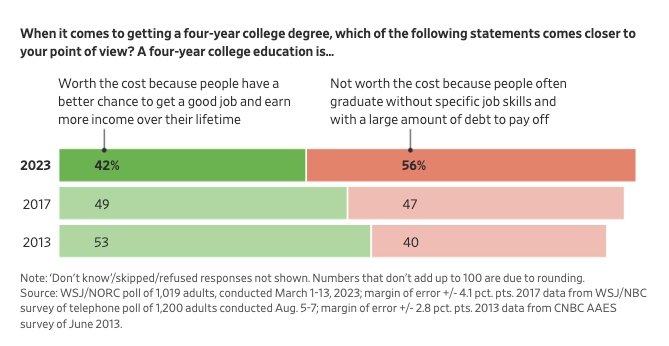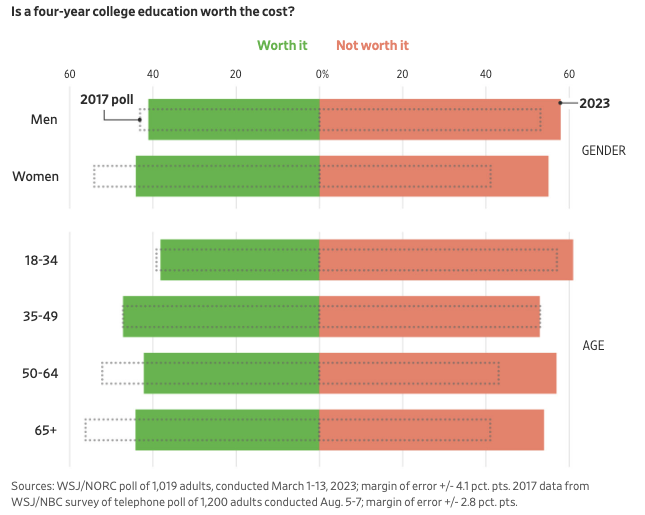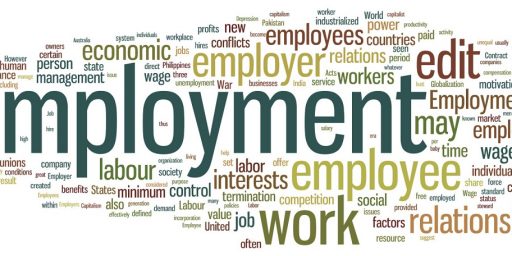Is a College Education Still Worth It?
Americans are losing confidence in the bargain.

WSJ (“Americans Are Losing Faith in College Education, WSJ-NORC Poll Finds“):
A majority of Americans don’t think a college degree is worth the cost, according to a new Wall Street Journal-NORC poll, a new low in confidence in what has long been a hallmark of the American dream.
The survey, conducted with NORC at the University of Chicago, a nonpartisan research organization, found that 56% of Americans think earning a four-year degree is a bad bet compared with 42% who retain faith in the credential.
Skepticism is strongest among people ages 18-34, and people with college degrees are among those whose opinions have soured the most, portending a profound shift for higher education in the years ahead.
In 2013, 53% of Americans were bullish on college, and 40% weren’t. In 2017, 49% of Americans thought a four-year degree would lead to good jobs and higher earnings, compared with 47% who didn’t.
Here’s the accompanying graphic:

This trendline isn’t surprising. Not only have we undergone a series of economic hits over the last fifteen years or so but the national focus on student loan debt has also created the inaccurate impression that most people who graduate college are saddled with a lifetime of debt.
Public skepticism toward higher education began to rise after the 2008 recession and compounded during the pandemic. Enrollment in U.S. colleges declined by about 15% over the last decade while the growth in alternative credentials, including apprenticeships, increased sharply.
In 2017, doubt over the value of a college degree was greatest among men, Republicans and people living in rural areas. That disaffection preceded a widening gender gap in higher education as hundreds of thousands of men left college during the pandemic

Again, not shocking. For at least two decades now, women have gone to college at higher rates than men. Partly, that’s a matter of socialization: girls tend to do better in high school than boys for all manner of reasons and boys tend to get into trouble, including becoming incarcerated, at much higher rates. Moreover, young men are much more likely to be attracted to the trades, truck driving, or military service—all of which pay decent wages to those with a high school diploma and don’t require forgoing four years of income.
This month’s Journal poll found disaffection has spread to all age groups as well as residents of cities and suburbs. The last categories in which a slim majority held fast to their faith in the value of a college degree were Democrats, those with a college degree and those earning more than $100,000 a year.
But 42% of people with college degrees said in the most recent survey that it wasn’t worth it, up more than 10 percentage points from the two polls last decade.
Women and older Americans are driving the decline in confidence. People over the age of 65 with faith in college declined to 44% from 56% in 2017. Confidence among women fell to 44% from 54%, according to the poll.
Again, my hunch for the 2017 vs 2023 changes is a function of national political and media narratives.
The rest of the report is a series of anecdotes, only one of which I find useful:
Paulo Eskitch, a 47-year-old violinist who lives in Tulsa, Okla., is less emphatic about whether his daughter, now 7 years old, should enroll in college when the time comes.
Mr. Eskitch has a master’s degree in music and earns about $30,000 a year playing in several different orchestras. He said a degree has become necessary in his field but he sometimes wishes he had pursued welding as a career because he thinks he could have made more money.
That said, he anticipates supporting his daughter if she decides to pursue higher education because there aren’t enough good alternatives.
“There are some fields you just can’t enter unless you have a college degree,” he said. “I’m not saying that’s right but it’s the way it is.”
There has never been a time where violinists—let alone in Tulsa—made more money than welders. Nor a time when people so passionate about violin that they would pursue an MFA in the field would have rather been welders.
But Eskitch points to a problem with the whole premise of the poll. Yes, there are plenty of jobs that require a college degree that don’t pay well, at least not on the long end of the tail. (I’m sure there are some very handsomely-compensated violinists out there. But most even very good ones wind up at a lesser orchestra or teaching middle school band.) Generally speaking, though, they’re otherwise pretty decent jobs: they’re indoors, in climate-controlled buildings; there’s little heavy lifting or risk of debilitating injury; the hours are reasonable; there are benefits, etc. That’s often not the case for even well-paid tradesmen.
It’s also true, though, that there has always been a certain cargo cult quality to the “everyone must go to college” idea. The median income of college graduates was always inflated because many high-paying jobs required a college education. Physicians, attorneys, architects, accountants, engineers, professors, and the like have been required to have college degrees for well over a century now. And, with the proliferation of college graduates after World War II, it became an entry standard for all manner of office jobs that simply require intelligence.
Social trends also inflated the value of a college degree for decades. As unionization of unskilled and semiskilled labor faded—and manufacturing jobs got outsourced to robots or offshored to foreign countries—the number of decent jobs available to those with only a high school diploma began to shrink. It took decades for those trends to impact white-collar workers, too.
The American economy has increasingly hollowed out. There are a relative handful of fantastically high-paying jobs and all of the pressures are to ruthlessly eliminate those that don’t bring the firm a very high return. At least for now, tradesmen are among the best positioned to survive because it’s very hard to offshore plumbers, electricians, and the like.






I was never well suited to schooling. I suppose it was inevitable I’d end up a carpenter and joining the union is the best thing I ever did.
Oh, good. Another American institution trashed and destroyed by a decades-long Republican smear campaign. They will burn down the entire country as long as they get to piss on the ashes.
The problem has become the cost of college as much as the expected income after. We have a daughter starting in the fall at a small public college here in SC. We paid into a 529 college fund (401(k) for education) and without it and scholarships, I don’t know how we would have paid. The available federal student loans would not have come close.
When I started college in 1991, costs were much lower, and federal loans were much easier to get.
@BugManDan: My old man put 3 daughters thru college on his salary alone (’70s Washington University, late ’70s early ’80s Mizzou, late ’80s early ’90s SEMO).
I see (and I hope you did as well) what they did there.
The poll participants believing a college education is currently on the minus side of the cost/benefit spectrum is NOT the same as “losing faith” in a college education.
This is a simple example of how an unsophisticated person (at least in terms understanding the tradecraft of mind control) can end up in the loss column of a misinformation battle. Americans aren’t “losing” faith in anything—that assumes they had “faith “ in the institution to begin with.
Americans have a transactional relationship with institutions. It’s either doing its job (or not) at reasonable cost (or not) with positive value for society (or not).
Because there is a RW effort to degrade trust in institutions that don’t share their values, they will astroturf and amplify EVERY bit of information that supports their campaign and tie it to their anchor phase “losing faith”. Have you ever been interested in a buying a car (or bought the car) and all of a sudden you see the car you’d like to buy everywhere? This strategy uses the same psychological phenomenon.
Nothing about the college vs professional cert discussion has anything to do with “losing faith” but it serves a framing and confirmation purpose for the RW mis information campaign. The discussion is actually a raw numbers discussion of supply, demand, and degree saturation vs pro cert shortage.
But a discussion like that only appeals to a small cross-section of people and is therefore not acceptable clickbait in todays infotainment sphere…and certainly not with RW/Conservative wired people
TLDR: Nothing to see here
@Jim Brown 32: You’re judging the poll question, which is rather straightforward, against the headline of the report on the results, which is more subjective. I’m a college professor with three degrees and whose three stepkids are (or graduated from) college and who expects his two kids to go to college. And, yet, were I asked whether it was worthwhile from a sheer economic cost-benefit perspective, I would say that it very much depends on what you major in and how talented you are.
Was looking at this yesterday and in polls it looks like about 80% of parents want their kids to have a white collar job so even parents who dont have one seem to want their kids to take that route. While a degree may be necessary for many jobs I think sometimes employers use it as a screening tool. Also because a 22 y/o employee is probably going to be about 100% better than one who is 18 y/o.
The cost issue is a huge part of this. This is something that gets talked about a lot but little is done about it. I think we know that the actual educators have not seen incomes grow out of proportion but we do know admin costs have soared as well as lifestyle costs (fancy gyms, dorms). All that said there is still a tournament aspect to college. The payoffs are actually pretty good for lots of jobs if you do well at school and get into one of those fields. I dont think we should be telling kids they cant try, that only kids with certain grades or scores should go to school.
Steve
Here’s some data that provides further context to this discussion.
Table 3. Detailed Years of School Completed by People 25 Years and Over by Sex, Age Groups, Race and Hispanic Origin: 2022
Table 3. Detailed Years of School Completed by People 25 Years and Over by Sex, Age Groups, Race and Hispanic Origin: 2017
@James Joyner: This is my point…the majority of the people engaging this story will take away the headline. The minority, gears towards nuance, will evaluate the poll work through various permutations of “It Depends… “
Personally, the current version of Higher Education for most people is simply a means to an end to make a living. Still depends on the person, but if one can maximize their entry level salary to a level that meets or exceeds their regional average. Get the cert and start making money and get an AA in your spare time.
For the type of people wired to benefit from what was the classical Trivium, Quadrivium, style of college education. Those people should attend college regardless of its ability to increase earnings. Of course, the overwhelming majority of these people aren’t going to entertain vocational specialties anyway.
I think that famous Adam Smith quote has become more and more true of American colleges and universities in recent decades: “The discipline of colleges and universities is in general contrived, not for the benefit of the students, but for the interest, or more properly speaking, for the ease of the masters.”
My apologies to our host, to whom I believe that does not apply
But it isn’t hard to find examples, such as Paul Krugman’s current contract.
There are a few positive examples, such as Purdue, under Mitch Daniels.
(What is even worse, in my opinion, is that our colleges and universities don’t teach very well, as Derek Bok argued, years ago.)
Income clearly goes up with educational attainment, https://www.silive.com/data/2022/08/salary-by-education-level-which-degrees-can-help-you-earn-the-most-money.html.
Is this enough to justify a $35-45 thousand dollar cost for four years (in state cost estimate at the University of Illinois website)? It looks like the college diploma adds about $500 per month to income according to the above website. Simple loan repayment calculations do not make it look worthwhile as a pure financial transaction. The college cost has to drop to $50,000 for all four years to pencil out.
These numbers would indicate severe downward pressure on the cost of college. Why haven’t colleges responded to this?
@OzarkHillbilly: I was early 90s Mizzou & late 90s/2000 grad school Clemson.
Early 90s was the real breaking point for cost at least at Mizzou. I was paying ~$70/credit hour in 91 and over 200 when I left and it continued to drastically increase as the state took away more & more funding.
Grad school would have been really high, but Clemson treated grad asst as employees so got really cheap rates.
That a college degree always leads to a good (paying) job has been debunked as such “guarantee” has been declining since the early 1970s. But now, the “cloning” of professors model of college is under threat by AGI (Artificial Gross Intelligence). At the same time, real education from college attendance has declined.
Quite the contrary the overt campus now promotes emotionalism, suppresses free speech (free speech being vital to learning how to think well) and principles are now subjective.
–Econtalk podcast with economist Ed Leamer, April 13, 2020
Colleges and universities don’t have the 40 or 50 years to adapt that they’ve needed in the past for faculty and ideologues to age off of campus.
The other factor impacting colleges, especially for males, is that the massive bubble the plugged trades in the 1970s as factories automated or moved offshore dumping thousands of partially experienced workers that filled the trades is retiring out. Now those who can fix things and work with tools are in high demand so unlike when I was coming out of high school and you had to have an uncle in the union for any hope of work in the trades, college is less a necessary option.
Whether or not college is a good investment depends upon the college and the major (as well as the student).
Worst investment: a degree in peace studies from a third tier liberal arts college
Best investment: a degree in fire science or nursing from a community college
@BugManDan:
When you look at the history of state budget structure over the last 50 years, the early-to-mid 90s is when Medicaid and state-level K-12 education funding really began to bite. I use “bite” in the sense that they became large enough to begin displacing General Fund spending in other areas. Of the other four major GF spending areas, higher ed is the only one without some sort of protection. When state funding goes down, tuition and fees go up.
Jeebus… almost 300% inflation over 4 years.
According to an article I read recently, some state universities have begun accepting out-of-state students with lower qualifications than in-state students. Because, of course, they can charge them higher tuition. (As I recall, the article didn’t name names, which is understandable, but unfortunate.)
I don’t think that’s what state legislatures had in mind when they set lower rates for in-state students.